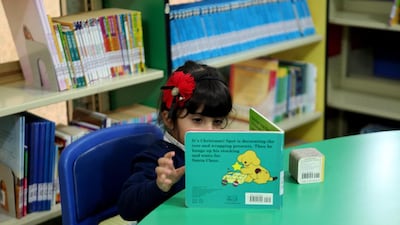To celebrate the Year of Reading, The National has teamed up with Scholastic, the specialist educational publisher, to give away more than 40,000 books to schoolchildren. To find out more and enter the weekly draw to win, visit www.thenational.ae/uaereads. Each week a member of the Scholastic family will share their thoughts about encouraging children to read:
The summer slide is real, and its impact on student achievement is both powerful and cumulative. Students who lack access to reading and learning opportunities during the summer may lose some of the academic progress they’ve made over the course of the school year. This is true for all students, but especially for struggling readers. Then, when school starts again in the autumn, these children are not ready for grade-level material and as a result, may lack the confidence necessary to catch up.
So what can families do to help to minimize the effects of summer slide? Here are some ideas:
Establish a regular family reading time. This might be a read-aloud, during which family members take turns reading from a book everyone enjoys together. Or it could be a parallel reading time, in which family members read their own books. Then, as a family, you can talk about what you’ve read!
Read an article together about current events, or about your child’s favourite sports team, actor or musician. See if your child can summarize what the article is about and tell you the main idea. What did he or she learn? Are there unanswered questions? The key is finding topics of interest so your child is engaged.
Encourage your child to keep writing, whether on a computer or in a journal. If you are going on a family trip, encourage your child to write about it, even to illustrate the places and people you’ve encountered.
Choose one night a week for family movie night and then together, discuss the plot, characters, themes and so on. Your child will be practising analytic and oral language skills, as you encourage him or her to share ideas and back them up with evidence (that is, explain where their ideas came from and how they arrived at their conclusions). Ask lots of questions to get your child thinking.
Look into summer programmes in your area. There may be some designed specifically for skill-building. Your school administration should have information about what’s available.
Don’t forget that kids can read all kinds of texts, including newspapers, magazines and articles online. (Audio books are another option that can be great for long car trips.) Check with your local library wherever you are to discover summer tips and borrowing options.
Your own attitude towards summer learning is key. Be supportive – you can help your child discover the joy of reading. A little effort during the summer means that he or she will welcome the challenges of a new school year, brimming with confidence and excitement. Just as an athlete keeps in shape through practice, learning skills have to be nurtured as well. Practising academic skills over the summer will add to the richness of a full and rewarding vacation, and help to prevent summer slide.
Madeline Boskey, PhD, is a developmental psychologist and consultant, devoted to literacy. She achieved her PhD in developmental psychology at the Graduate Center of City University in New York, where she studied language acquisition and cognitive development. In her consulting work her focus is on finding ways to make learning interactive and enjoyable.
This story was originally published on Scholastic's blog, On Our Minds.

